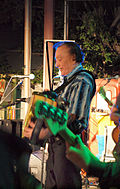Recipients
| ‡ | Indicates non-performing recipient |
|---|
| Year | Image | Recipient | Nationality | Ref. |
|---|---|---|---|---|
| 1993 | — | Morton Gould | United States | [4] |
| 1994 |  | Emilio Estefan ‡ | Cuba United States | [5] |
| 1995 |  | Tito Puente | United States | [13] |
| 1996 |  | José Feliciano | Puerto Rico | [14] |
| 1997 |  | Herb Alpert | United States | [12] |
| 1998 | — | Ralph Mercado ‡ | United States | [15] |
| 1999 |  | Flaco Jiménez | United States | [16] |
| 2000 |  | Jorge Pinos ‡ | Ecuador | [6] |
| 2001 |  | Los Lobos | United States | [2] |
| 2002 |  | El Gran Combo de Puerto Rico | Puerto Rico | [17] |
| 2003 | No award | [7] | ||
| 2004 | [8] | |||
| 2005 |  | Marco Antonio Solís | Mexico | [10] |
| 2006 | No award | [9] | ||
| 2007 |  | Miguel Bosé | Spain | [18] |
| 2008 |  | Conjunto Primavera | Mexico | [19] |
| 2009 |  | Carlos Santana | Mexico United States | [20] |
| 2010 |  | Los Temerarios | Mexico | [3] |
| 2011 |  | Emmanuel | Mexico | [21] |
| 2012 |  | Intocable | Mexico | [22] |
| 2013 |  | José José | Mexico | [23] |
| 2014 |  | Andrea Bocelli | Italy | [24] |
| 2015 |  | Roberto Carlos | Brazil | [25] |
| 2016 |  | Marco Antonio Solís | Mexico | [11] |
| 2017 |  | Ricardo Arjona | Guatemala | [26] |
| 2018 |  | Maná | Mexico | [27] |
| 2019 |  | Juan Luis Guerra | Dominican Republic | [28] |
| 2020 |  | Armando Manzanero | Mexico | [29] |
| 2021 |  | Paquita la del Barrio | Mexico | [30] |
| 2022 |  | Raphael | Spain | [31] |
| 2023 |  | Los Ángeles Azules | Mexico | [32] |
| 2024 |  | Alejandro Sanz | Spain | [33] |
| 2025 | No award | [34] | ||